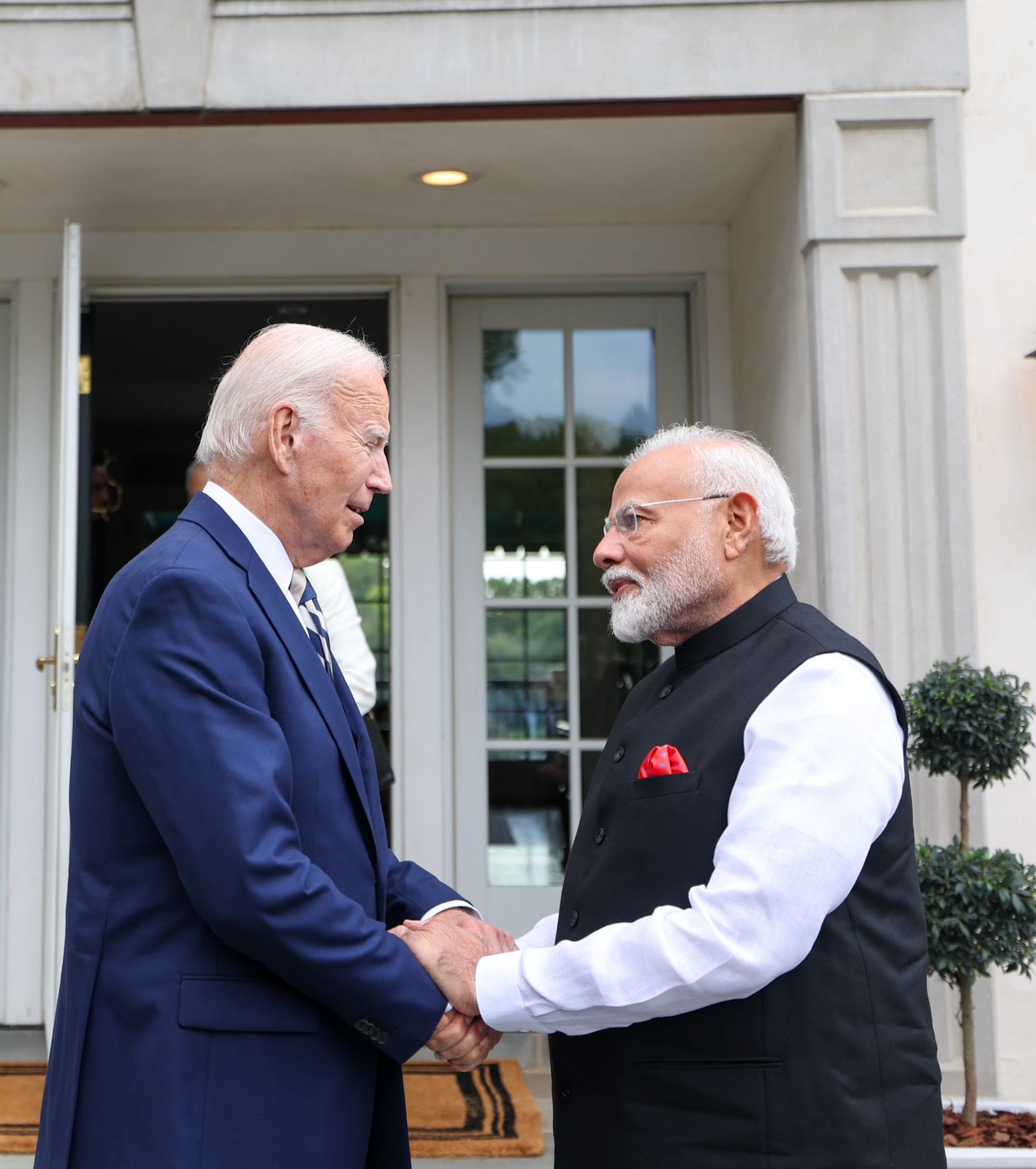Prime Minister Narendra Modi and President Joe Biden of the United States held bilateral talks on the sidelines of the Quad Summit at Biden’s residence in Delaware on Saturday.
The US president lauded PM Modi for his historic visit to Ukraine and his message of peace amid the war with Russia. The US also supported India’s permanent membership in the UN Security Council.
Key highlights from the meeting:
Elevating India-US relations
Prime Minister expressed his appreciation for President Biden’s unparalleled contributions to enhancing the India-US partnership, as stated by the Ministry of External Affairs (MEA). Recalling his earlier visit to the US last year and President Biden’s trip to India for the G20 summit, the Prime Minister noted that these visits have led to greater dynamism and depth in the India-US relationship.
The Prime Minister highlighted that India and the US now share a robust global strategic partnership that encompasses all aspects of human endeavor, fueled by common democratic values, aligned interests, and dynamic people-to-people connections. The two leaders explored opportunities to strengthen bilateral cooperation in areas of mutual interest and exchanged perspectives on global and regional matters, including the Indo-Pacific region and beyond.
India as a leader
President Biden expressed appreciation for India’s leadership on the world stage, particularly Prime Minister Modi’s role in the G20 and the Global South, according to a White House statement. The US President praised the Prime Minister’s commitment to strengthening the Quad to ensure a free, open, and prosperous Indo-Pacific.
“India is at the forefront of efforts to seek solutions to the most pressing challenges, from supporting the global response to the COVID-19 pandemic to addressing the devastating consequences of conflicts around the world,” the White House said.
President Biden lauded Prime Minister Modi for his historic visits to Poland and Ukraine, the first by an Indian Prime Minister in decades, and for his message of peace and ongoing humanitarian support for Ukraine. The statement did not address the Prime Minister’s visit to Russia.
President Biden assured Prime Minister Modi that the US supports initiatives to reform global institutions to “reflect India’s important voice” and backed India’s permanent membership in a reformed UN Security Council.
Forging new frontiers in technology and space cooperation
President Biden and Prime Minister Modi celebrated the success of the Initiative on Critical and Emerging Technology (iCET) in enhancing cooperation in key sectors like space, semiconductors, and advanced telecommunications. They committed to improving collaboration in artificial intelligence, quantum technology, and clean energy, while strengthening ties with partners through the Quad and the US-India-ROK Trilateral Technology initiative.
The leaders also endorsed deeper cyberspace cooperation and announced the establishment of a semiconductor fabrication plant for national security and green energy. Additionally, they welcomed progress on joint NASA-ISRO scientific research aboard the International Space Station in 2025.
Strengthening partnerships in defense and aerospace
The US President praised India’s progress in procuring 31 General Atomics MQ-9B remotely piloted aircraft, enhancing the intelligence and surveillance capabilities of its armed forces. The leaders acknowledged advancements in the US-India Defense Industrial Cooperation Roadmap, focusing on co-production arrangements for jet engines, munitions, and ground mobility systems.
President Biden welcomed India’s implementation of a 5 percent GST on maintenance, repair, and overhaul (MRO) services, which simplifies the tax structure and supports India’s goal of becoming a leading aviation hub.
They also celebrated a teaming agreement between Lockheed Martin and Tata Advanced Systems to establish a new MRO facility for the C-130J Super Hercules aircraft in India, reinforcing US-India defense cooperation.
Advancing clean energy initiatives and supply chains
Prime Minister Modi and President Biden endorsed joint efforts to enhance clean energy supply chains through US and Indian manufacturing. They aim to unlock $1 billion in multilateral financing for projects across the clean energy value chain, including renewable energy and zero-emission vehicles. The US International Development Finance Corporation (DFC) has provided a $250 million loan to Tata Power Solar and $500 million to First Solar for manufacturing facilities in India.
The leaders also welcomed collaboration on a National Center for Hydrogen Safety and emphasized their commitment to accelerating renewable energy and clean technology initiatives in India.
Health and economic cooperation
Prime Minister Modi and President Biden celebrated the new US-India Drug Policy Framework to combat synthetic drug trafficking while enhancing public health collaboration. They highlighted the inaugural US-India Cancer Dialogue in August 2024, aimed at accelerating cancer research and development.
The leaders also welcomed a Memorandum of Understanding to boost cooperation between US and Indian small and medium-sized enterprises, focusing on trade, technology, and the green economy. Additionally, they emphasized enhanced agricultural cooperation, addressing climate-smart practices and regulatory issues to increase bilateral trade.
Return of antiquities
A symbolic handover of select artefacts took place on the sidelines of his bilateral meeting with President Biden in Wilmington, Delaware.
The United States returned 297 antiquities to India that were either stolen or trafficked from the country. The repatriation of these artefacts follows a Cultural Property Agreement signed in July 2024 between the U.S. State Department’s Bureau of Educational and Cultural Affairs and the Archaeological Survey of India under the Ministry of Culture.














